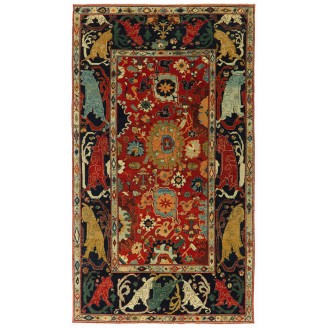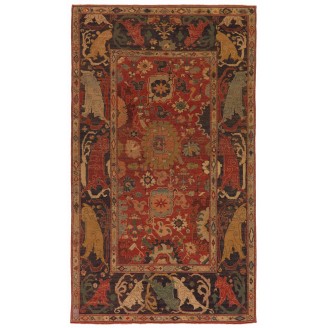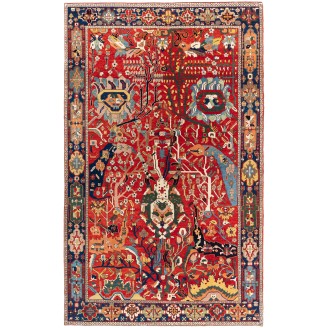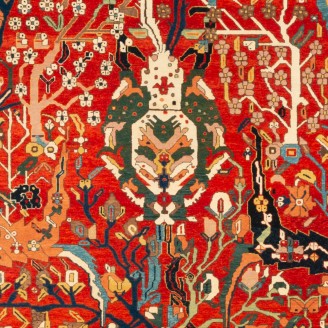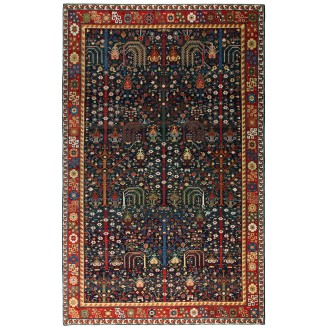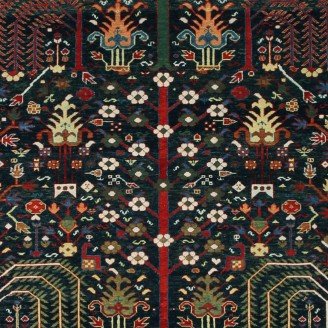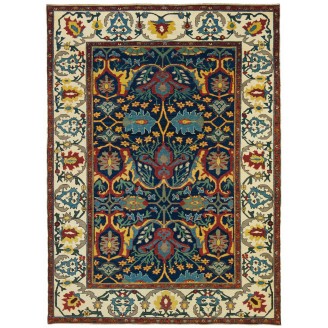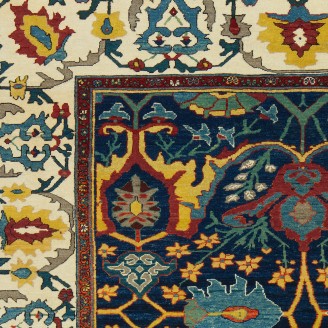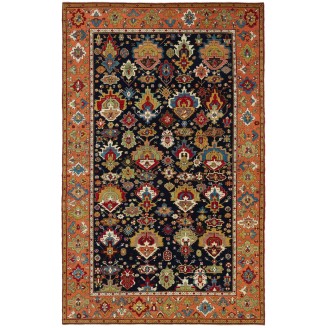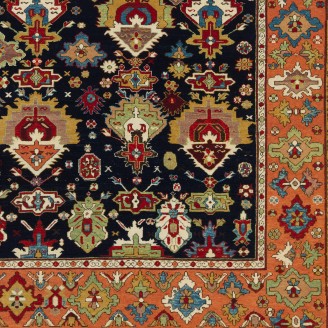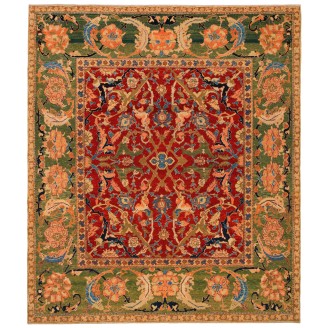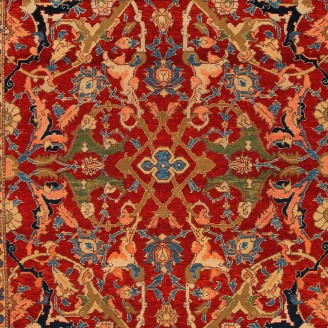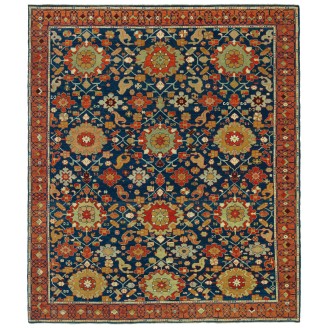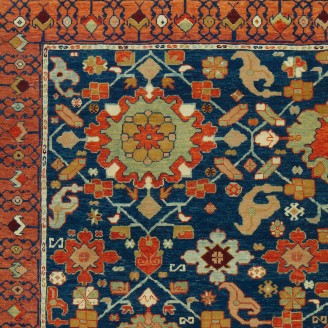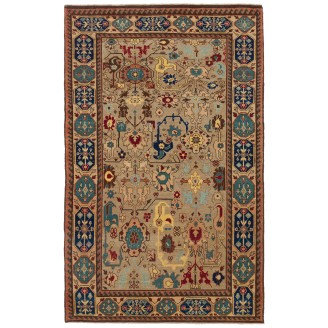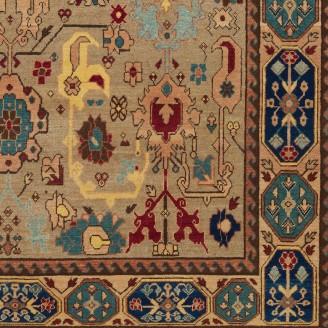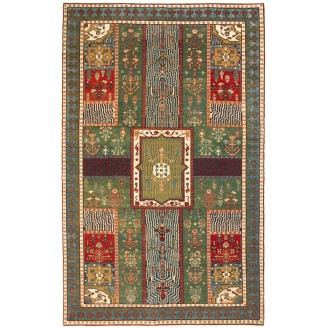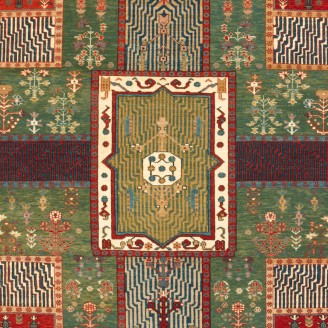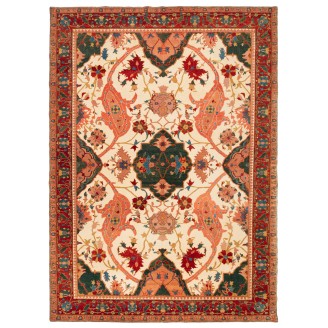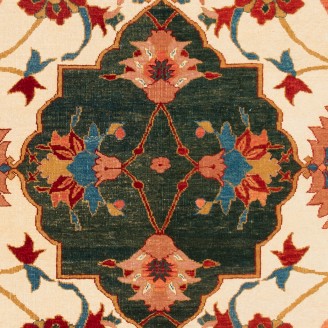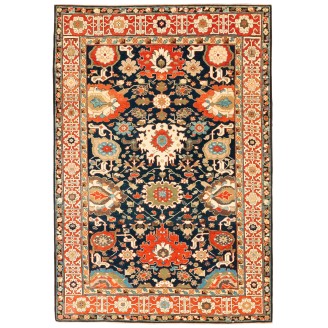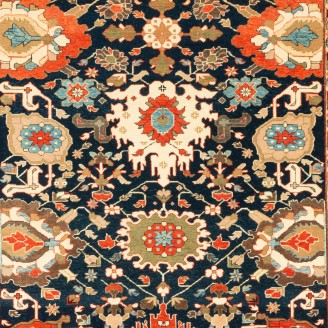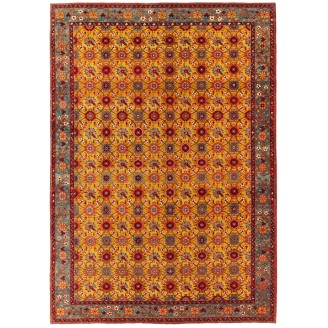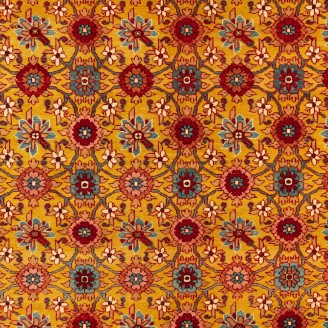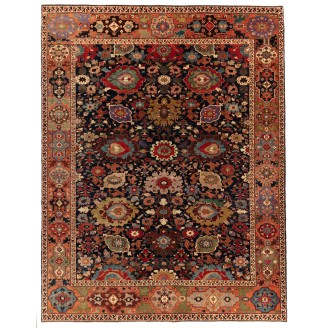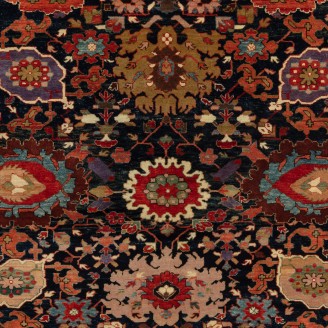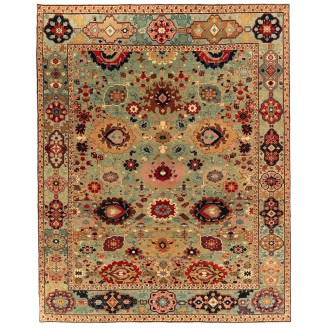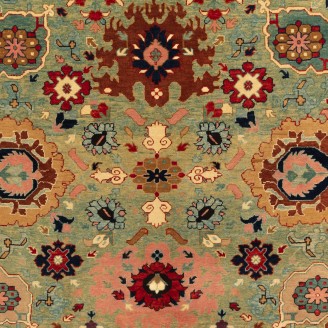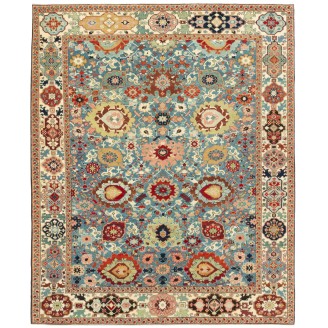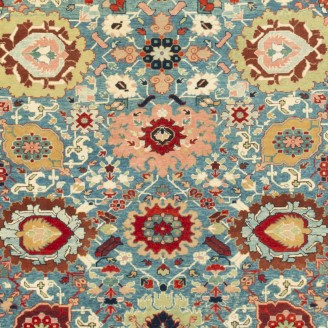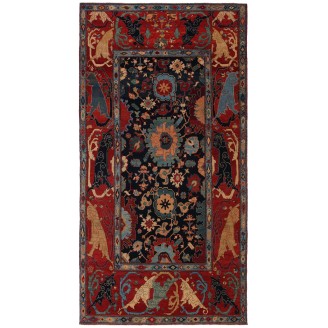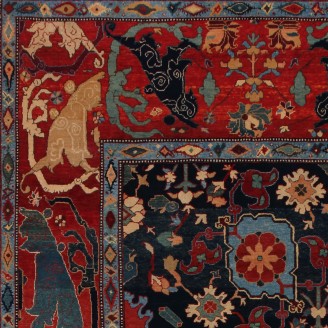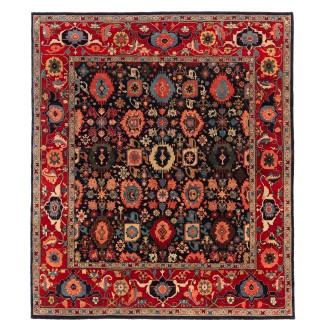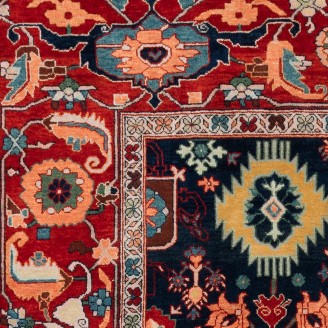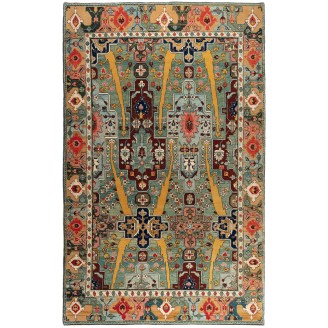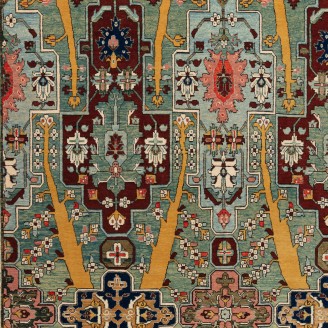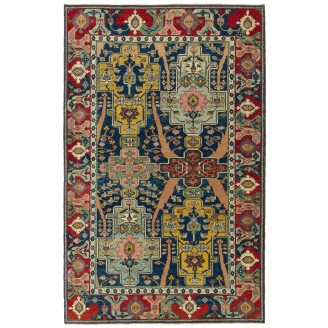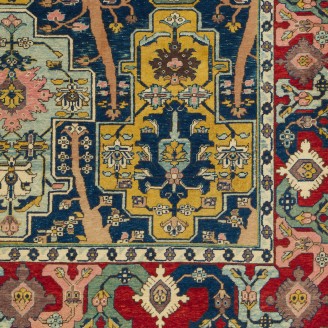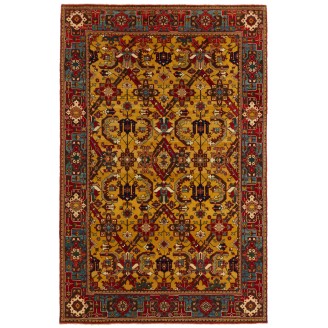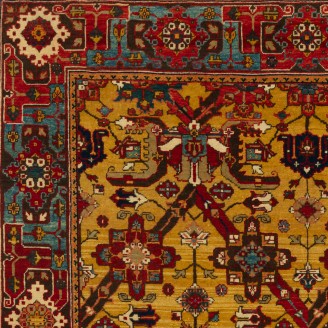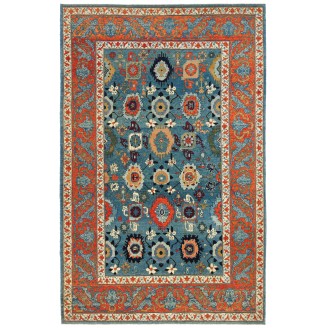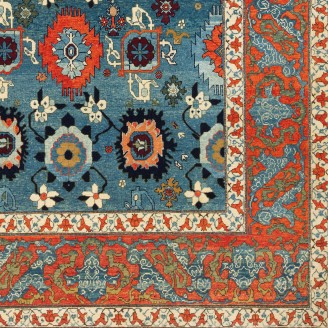COLLECTION OF BIDJAR RUGS
Roof of Iran. Showcases the exquisite artistry and durability of Persian weaving
Model: ART00757
Dimensions: 5'8" X 10'0"(175cm x 306cm)
Luxury Palmettes and Flowers Lattice Rug
Experience luxury with this exquisite handwoven Palmettes and Flowers Lattice Rug from Ararat Rugs. The intricate lattice design adorned with beautiful palmettes and delicate flowers showcases the artistry of Eastern Turkiye craftsmanship. Elevate your spa..
Price:
$11,200
Ex Tax:$11,200
Model: ART00227
Dimensions: 6'11" X 11'8"(213cm x 358cm)
The source of the carpet comes from the book The Kevorkoff Carpet, Hali Magazine 1994 Issue 73. This is a large and brilliantly colored, derivation from a vase carpet, an 18th-century rug from the North-west Persia area. As mentioned in the Hali magazine article by Ian Bennett, the original size is ..
Price:
$22,000
Ex Tax:$22,000
Model: ART00268
Dimensions: 7'7" X 12'1"(233cm x 369cm)
The source of the rug comes from the book Antique Rugs of Kurdistan A Historical Legacy of Woven Art, James D. Burns, 2002 nr.45. This is a popular design employed by the Kurds, called bid majnum (or Bid Majnun, weeping willow) 17th-century rug from Sa'uj Bulagh, Eastern Kurdistan area. Four differe..
Price:
$23,000
Ex Tax:$23,000
Model: ART00531
Dimensions: 5'9" X 7'10"(177cm x 240cm)
This is a Bidjar rug designed in the 19th century from the Bidjar region, also known as Bijar, which is a region in northwestern Iran known for producing some of the finest and most durable rugs in the world. During the 19th century, Bidjar rugs gained prominence and were in high demand. They were f..
Price:
$9,300
Ex Tax:$9,300
Model: ART00445
Dimensions: 5'10" X 9'3"(179cm x 282cm)
The source of the rug comes from the book Orient Star - A Carpet Collection, E. Heinrich Kirchheim, Hali Publications Ltd, 1993 nr.75. This offset pattern is composed of ascending shield-like palmettes flanked by leaf-like wings designed for 17th to 18th-century rugs from Azerbaijan, the North-west ..
Price:
$11,000
Ex Tax:$11,000
Model: ART00264
Dimensions: 5'11" X 6'11"(181cm x 213cm)
The source of the carpet comes from the book Oriental Rugs in the Metropolitan Museum of Art, Dimand, Maurice S., and Jean Mailey, The Metropolitan Museum of Art, New York 1973 fig.90. If the so-called vase-technique carpets represented the triumph of Safavid workshop weaving in the seventeenth cent..
Price:
$8,800
Ex Tax:$8,800
Model: ART00516
Dimensions: 6'8" X 7'9"(205cm x 238cm)
This offset pattern is composed of palmettes and flowers, one has the impression that it is only part of a larger scheme designed 19th-century rug from the Bidjar region, Eastern Kurdistan area. Very similar palmettes, drawn in a curvilinear manner and combined with identical forked leaves, can be s..
Price:
$9,300
Ex Tax:$9,300
Model: ART00330
Dimensions: 4'3" X 6'9"(131cm x 208cm)
The source of the rug comes from the book Antique Rugs of Kurdistan A Historical Legacy of Woven Art, James D. Burns, 2002 nr.40. This offset pattern is composed of palmettes and stems with large forked leaves, one has the impression that it is only part of a larger scheme designed 17th-century rug ..
Price:
$5,300
Ex Tax:$5,300
Model: ART00394
Dimensions: 6'1" X 9'8"(187cm x 297cm)
The source of the rug comes from the book Islamic Carpets, Joseph V. McMullan, Near Eastern Art Research Center Inc., New York 1965 nr.28. This Persian Garden design rug belongs to the second half 18th century from the Persia area. The design of this rug is based on the Formal Persian Garden. There ..
Price:
$12,000
Ex Tax:$12,000
Model: ARTK0002
Dimensions: 7'9" X 10'8"(238cm x 326cm)
This is a with a central medallion carpet design 19th century from Garrus ( Gerous or Garus ) region, Eastern Kurdistan area. Garrus is located in the foothills approaching the flatlands of Persia, Garrus has been a significant Kurdish city since antiquity when it was the capital of Media Minor. Imp..
Price:
$29,000
Ex Tax:$29,000
Model: ART00269
Dimensions: 5'6" X 7'11"(169cm x 243cm)
The source of the rug comes from the book Orient Star - A Carpet Collection, E. Heinrich Kirchheim, Hali Publications Ltd, 1993 nr.79. This is unusual design 18th or 19th century rug from Khila, Kuba region East Caucasus area. Very similar palmettes, drawn in a curvilinear manner and combined with i..
Price:
$7,600
Ex Tax:$7,600
Model: ART00305
Dimensions: 6'7" X 9'3"(202cm x 283cm)
The source of the rug comes from the book Antique Rugs of Kurdistan A Historical Legacy of Woven Art, James D. Burns, 2002 nr.2. This was an exclusive example of a Mina Khani lattice design mid-19th century rug from Koliya'i, Southern Kurdistan area. The mina khani is composed of a series of rows of..
Price:
$16,600
Ex Tax:$16,600
Model: ART00310
Dimensions: 7'10" X 10'0"(241cm x 306cm)
The source of the rug comes from the book How to Read - Islamic Carpets, Walter B. Denny, The Metropolitan Museum of Art, New York 2014 fig.82. This was an exclusive example of a palmette lattice design 19th-century rug from Northwestern Persia. The design employs floral, richly complex repeating ar..
Price:
$16,800
Ex Tax:$16,800
Model: ART00320
Dimensions: 7'10" X 9'10"(240cm x 300cm)
The source of the rug comes from the book How to Read - Islamic Carpets, Walter B. Denny, The Metropolitan Museum of Art, New York 2014 fig.82. This was an exclusive example of a palmette lattice design 19th-century rug from Northwestern Persia. The design employs floral, richly complex repeating ar..
Price:
$15,800
Ex Tax:$15,800
Model: ART00353
Dimensions: 8'0" X 9'7"(244cm x 293cm)
The source of the rug comes from the book How to Read - Islamic Carpets, Walter B. Denny, The Metropolitan Museum of Art, New York 2014 fig.82. This was an exclusive example of a palmette lattice design 19th-century rug from Northwestern Persia. The design employs floral, richly complex repeating ar..
Price:
$18,600
Ex Tax:$18,600
Model: ART00017
Dimensions: 5'9" X 11'0"(176cm x 336cm)
This offset pattern is composed of palmettes and flowers, one has the impression that it is only part of a larger scheme designed 19th-century rug from the Bidjar region, Eastern Kurdistan area. Very similar palmettes, drawn in a curvilinear manner and combined with identical forked leaves, can be s..
Price:
$14,000
Ex Tax:$14,000
Model: ARTK0003
Dimensions: 7'11" X 9'4"(242cm x 285cm)
This offset pattern is composed of palmettes and flowers, one has the impression that it is only part of a larger scheme designed for 19th-century rugs from the Bidjar region, Eastern Kurdistan area. Very similar palmettes, drawn in a curvilinear manner and combined with identical forked leaves, can..
Price:
$23,000
Ex Tax:$23,000
Model: ART00315
Dimensions: 6'6" X 10'5"(200cm x 319cm)
The source of carpet comes from the book Orient Star - A Carpet Collection, E. Heinrich Kirchheim, Hali Publications Ltd, 1993 nr.64 and Islamic Carpets, Joseph V. McMullan, Near Eastern Art Research Center Inc., New York 1965 nr.26. This is a long Khorassan Compartment and tree design 17th-century ..
Price:
$11,800
Ex Tax:$11,800
Model: ART00486
Dimensions: 4'8" X 7'3"(143cm x 222cm)
The source of carpet comes from the book Orient Star - A Carpet Collection, E. Heinrich Kirchheim, Hali Publications Ltd, 1993 nr.64 and Islamic Carpets, Joseph V. McMullan, Near Eastern Art Research Center Inc., New York 1965 nr.26. This is a long Khorassan Compartment and tree design 17th-century ..
Price:
$6,000
Ex Tax:$6,000
Model: ART00502
Dimensions: 4'11" X 7'5"(151cm x 228cm)
The source of carpet comes from the book Orient Star - A Carpet Collection, E. Heinrich Kirchheim, Hali Publications Ltd, 1993 nr.63. This is a lattice design 17th-century carpet from Khorasan, Eastern Persia. Dr. Friedrich Spuhler was formerly Curator of Islamic Art in Berlin-Dahlem. In 1978 he bec..
Price:
$6,870
Ex Tax:$6,870
Model: ART00511
Dimensions: 6'7" X 10'2"(202cm x 310cm)
This offset pattern is composed of palmettes and flowers, one has the impression that it is only part of a larger scheme designed 19th-century rug from Bidjar region, Eastern Kurdistan area. Very similar palmettes, drawn in a curvilinear manner and combined with identical forked leaves, can be seen ..
Price:
$12,000
Ex Tax:$12,000
